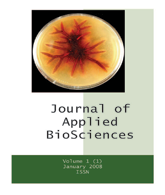Journal of Applied Biosciences (J. Appl. Biosci.) [ISSN 1997 - 5902]
Volume 50: 3540 - 3548. Published February 27, 2012.
Isolation and characterization of pathogenic Yersinia enterocolitica from pigs in Abidjan, Côte d’Ivoire.
Atobla K.1, Karou T.G.1, Dadie A.T.2, Niamke L.S.1, Dje K.M.2
1 Laboratory of Biotechnology of the department of Biosciences, University of Cocody, Abidjan, 22 BP 582 Abidjan 22, Côte d’Ivoire.
2 Laboratory of Biotechnology and Microbiology of Foods of the department of Technology and Food Science, University of Abobo-Adjamé, 02 BP 801 Abidjan 02, Côte d’Ivoire.
Corresponding author: Email address: [email protected] ; Phone: +225 07488478; Postal address: 21 BP 889 Abidjan 21
ABSTRACT
Objective: To investigate the prevalence and to characterize of pathogenic Yersinia enterocolitica strains recovered from raw pig samples from a slaughterhouse in Abidjan, Côte d’Ivoire.
Methodology and Results: A total of 310 different pig samples from a slaughterhouse in Abidjan were examined by using pre-enrichment in trypticase soya broth followed by cold enrichment in phosphate buffered saline broth. Aulisio’s alkali treatment method was then performed before streaking onto MacConkey agar. Three pathogenic Yersinia enterocolitica strains were isolated from different pig samples. Fromtongue samples, Y. enterocolitica strains were isolated in 1% (2/200) and in 0.9% (1/110) of fecal samples.All the three strains were biotype 4, serotype O: 3 and phagetype VIII. The strains were negative for the pyrazinamidase test, lipase, esculin, and autoagglutination and not motile at 25°C. Y. enterocolitica strains showed multiple resistances to antibiotics such as sulfonamide and erythromycin.
Conclusion: Y. enterocolitica 4/O: 3/VIII strains were potentially pathogenic, representing a risk for the consumers in regard to yersiniosis in human health. This study showed that Yersinia enterocolitica biotype 4 serotype O: 3 phagetype VIII which is the most frequent cause of sporadic yersiniosis in Europe is present in Côte d’Ivoire and this bioserotype species comes from pigs, the main reservoir. Therefore, it is necessary to educate the public about the consumption of raw or undercooked pork. To our knowledge, this study is the first which shows the presence of Yersinia pathogen in pigs in Côte d’Ivoire. The results obtained in the present study could serve for future investigations of the Yersinia enterocolitica infection, mainly focusing on the possible contamination routes at the pork production and possibility of prevention at farm level.
Keywords: Yersinia enterocolitica, pathogenic, Pigs, tongue, fecal, prevalence, antibiotic.
FULL PAPER [PDF AVAILABLE HERE]
